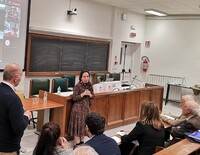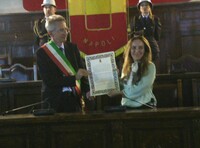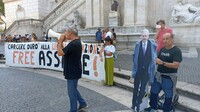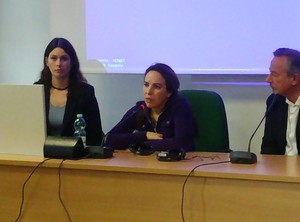Stella Assange: "You students – and the millions supporting Julian – are making a difference."
"This April 11th," she reminded the audience, "it will be four years that Julian has been incarcerated in a maximum security prison in London – and for what? For revealing U.S. and British war crimes in Iraq, Afghanistan, and at the Guantánamo prison camp," an institution she called "illegal".
Instead, the perpetrators of the crimes Julian revealed have never been prosecuted, despite the tacit admission by the US/UK governments that Assange's revelations are true – all of them, Stella added.
What, then, is supposed to be the crime committed by the founder of WikiLeaks, the highly original encrypted web site that allows anyone to anonymously leak scathing (and even classified) documents which are then vetted and published by Assange and his staff? The U.S. Department of Justice (DOJ), invoking a 1917 law, argues that Assange's disclosure of classified documents to support his revelations constitutes an act of "espionage" – even though a 1971 U.S. Supreme Court ruling has established that the dissemination of classified documents is entirely lawful if done "in the public interest." After all, that is what all investigative journalists routinely do, the Court added.
But the DOJ thinks that, by invoking the 1917 Espionage Act, it has found a loophole to prevent the "public interest" justification from applying to Julian's case. It is therefore seeking the extradition of the editor of WikiLeaks to the United States so that he can be tried and, in effect, imprisoned for life.
While the extradition proceedings drag on, the United Kingdom is holding Assange in total solitary confinement in the notorious Belmarsh Prison, without access to any means of communication – perhaps for fear that he will release other scathing documents still stored in hidden folders on his site. "But this detention, now lasting four years, is completely arbitrary," Stella pointed out to the political science students, "as were arbitrary the previous seven years of forced confinement in the Ecuadorian Embassy in London – and this is not my opinion, but the opinion of the UN Working Group on Arbitrary Detention."
"How ironic!" exclaimed MEP Pignedoli, known for her investigations into 'ndrangheta (the Calabrian mafia); "there have been gangland bosses released after only one year of pre-trial detention," i.e., when there has been no trial within the prescribed period of precautionary imprisonment. Could it be that British judges have prescribed no time limit for Julian Assange precisely to avoid having to release him if he is held without trial beyond a certain date? This means that Julian could remain in pre-trial custody in a Maximum Security Prison and in solitary confinement theoretically for the rest of his life. "A limbo," as Stella called it during her talk.
Journalist Riccardo Iacona, who hosts the popular TV series Presa Diretta and who chaired the encounter organized by Pignedoli's staff in collaboration with the Faculty of Political Science, then took the floor to emphasize how much the Assange case "touches us all, touches the core of European values". Julian’s extradition, he said, would be “a setback for our democracy; indeed, it would call it into question."
"But that is just the point," Stella insisted, taking the floor again, "The spectacle of Julian imprisoned is deliberately intended to warn journalists all around the world – but also NGOs and ordinary citizens as well – that if you try to hold Power accountable, Power will make you pay for it." Thus, the judicial persecution of Julian "is, in reality, an attack on a Free Press and on Free Speech everywhere."
Indeed, if Assange is extradited and convicted, the DOJ could use the case as a precedent to grab, extradite and imprison in the U.S. any journalist or activist anywhere in the world, thereby becoming, to all effects, a planetary Sheriff. For example, a DOJ posse roaming around Italy could round up the great Italian investigative journalist Antonio Mazzeo, who has frequently ruffled feathers in Washington with his revelations of misdoings at U.S. military bases in Italy. Just think of his investigation into the harmful effects on the local population of the MUOS radar facility in Sicily. To back up his claims, Mazzeo revealed official U.S. Navy documents that he had managed to obtain. But this means that, by invoking the (for now hypothetical) conviction of Assange, the DOJ could jail Mazzeo for life in a U.S. prison, for simply having done his job as a reporter in Italy. Investigative journalists everywhere routinely use leaked documents – at least, up to now; but an Assange conviction could cripple them definitively.
What if China or Turkey did the same thing to American journalists who used leaked documents to reveal President Xi’s or President Erdogan’s misdeeds – i.e., in virtue of the precedent set by the Assange case, grab them in the U.S. and deport them to China or Turkey to be imprisoned for life?
Paradoxically, in making its charges, the DOJ claimed that Julian was not protected by the First Amendment to the U.S. Constitution, which guarantees freedom of expression, because he is not a U.S. citizen (he was born and raised in Australia and resided in Europe). Yet at the same time, the DOJ also claimed that Assange was nonetheless subject to a U.S. law (the Espionage Act) intended for U.S. citizens or residents. "This is clearly judicial overreach: the case should be thrown out of court," Stella concluded.
Born in South Africa to a Spanish mother and Swedish father, Stella was a young lawyer and human rights activist living in London when, in 2012, she was recruited by Assange's legal staff specifically because she knew Spanish (so she could deal with the Ecuadorian authorities) and Swedish (so she could help dismantle the false accusations against Assange brought by the State Prosecutor in Sweden). Her name at birth was Sara González (mother) Devant (father) but, at Julian's advice, she legally changed it so she could slip under the CIA's radar – for example, when buying airline tickets. When asked why she chose to call herself "Stella Moris" (with an unusual spelling for her family name), she replied, "Because I liked the sound of it."
Articoli correlati
 Gli insegnamenti di Antonio Gramsci sono sempre attuali
Gli insegnamenti di Antonio Gramsci sono sempre attualiRipensare l’attivismo antimilitarista e anti NATO
“Manifestazioni, marce, dichiarazioni sono alcune delle armi – ormai spuntate – nel repertorio degli attivisti politici tradizionali; bisogna rinnovarle” sostiene Patrick Boylan, co-fondatore delle associazioni Rete NoWar, Free Assange Italia e U.S. Citizens for Peace & Justice.22 January 2025 - Redazione Luci e ombre nel Capoluogo umbro
Luci e ombre nel Capoluogo umbroA Perugia, ancora un premio di giornalismo conferito a Julian Assange
Ma il Festival per il Giornalismo che si svolge nella stessa città continua a snobbarlo. Assange viene perseguitato dal Potere perché considerato reo di aver diffuso, nell’interesse pubblico, documenti segreti che rivelano gli illeciti commessi dai Governi.23 March 2024 - Patrick Boylan In una suggestiva cerimonia tenutasi nella Sala dei Baroni dell’imponente Castel nuovo di Napoli
In una suggestiva cerimonia tenutasi nella Sala dei Baroni dell’imponente Castel nuovo di NapoliNapoli consegna a Stella Assange il certificato di cittadino onorario attribuito al marito Julian
Venerdì scorso (10 novembre), il Sindaco di Napoli Gaetano Manfredi ha consegnato la pergamena di cittadinanza onoraria per Julian Assange nelle mani della moglie, Stella Moris Assange, venuta per l’occasione nella città partenopea.12 November 2023 - Patrick Boylan Il "Giorno X" (Day X) si avvicina...
Il "Giorno X" (Day X) si avvicina...Una settimana cruciale per Julian Assange all’Alta Corte londinese e al Campidoglio di Roma
Mentre Julian Assange sta affrontando il momento più drammatico della sua decennale persecuzione giudiziaria, l’Assemblea Capitolina di Roma sta deliberando se dargli o meno una mano – una mano simbolica, certo, ma importantissima: il conferimento della cittadinanza onoraria della città di Roma.27 July 2023 - Patrick Boylan


Sociale.network